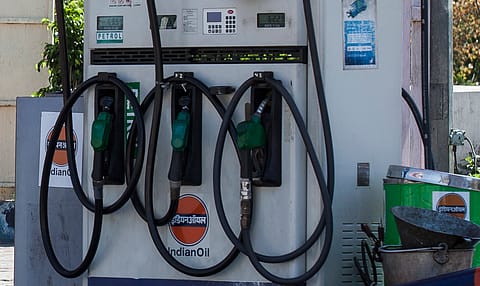Oil stocks up as govt cuts windfall tax on petroleum cude to zero
Levy on petrol, diesel, and aviation turbine fuel has been kept unchanged at zero

In a huge relief to domestic oil companies, the government has cut the windfall tax on petroleum crude to zero from ₹4,100 ($50.13) per tonne from May 18 onwards. This development comes after the Centre slashed the petroleum crude levy to ₹4,100 per tonne from ₹6,400 per tonne earlier in May 2023. Before that, the government had reintroduced the windfall tax of ₹6,400 per tonne on domestically produced crude oil to rationalise the tax structure in the petroleum sector.
This time around, the levy on petrol, diesel, and aviation turbine fuel (ATF) has been kept unchanged at zero. These duties are reviewed every fortnight, taking into account all relevant factors including international prices, exchange rate, and quantity of exports.
Following the development, stocks of companies in the oil sector saw positive momentum. Shares of three state-run oil retailers— Indian Oil Corporation Limited (IOCL), Bharat Petroleum Corporation Limited (BPCL) and Hindustan Petroleum Corporation Limited (HPCL) were all trading in the green on Tuesday at 1.90%, 1.04% and 0.12%, respectively.
Oil producers like Oil & Natural Gas Limited (ONGC), which is also the country’s largest oil and gas producing company, also saw its shares rise 1.18% in the intra-day trade. Mukesh Ambani-led Reliance Industries, however, witnessed a 0.024% fall in its stock at ₹2,488.75. In contrast, the S&P BSE Sensex was down 103.96 points or 0.17% to 62,241. The NSE Nifty index was down 0.17% to 18,368.05.
The Central Government, had, with effect from July 1, 2022, imposed duties or cesses on domestically produced crude petroleum and export of petrol, diesel and aviation turbine fuel.
The levy on petroleum crude (domestic production) export stood at ₹23,500 per tonne initially, while the duties on the export of petrol, diesel and ATF stood at ₹6/litre, ₹13/litre, and ₹4/litre, respectively. However, subsequently, the Centre reduced the prices, depending on various factors.
The domestic producers of petroleum crude like ONGC sell their crude at international parity prices. The government had introduced the windfall tax after international crude prices rose sharply and crude producers were resorting to making super-normal profits.
Recommended Stories
The prices of diesel, petrol, and ATF rose even more sharply last year, which led to extraordinary cracking margins (difference between the product price and the crude price) on exports of these products.
The government earlier said the prices of petrol and diesel have not been increased by public sector oil marketing companies (OMCs) since April 6, 2022, despite record-high international prices. As a result, the three state-run fuel retailers — Indian Oil, BPCL and HPCL control around 90% of the fuel retailing network in India — booked a combined loss of ₹27,276 crore in the first six months of FY2022-23.